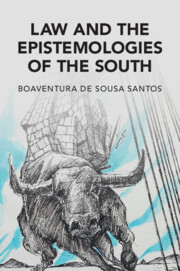Book contents
- Law and the Epistemologies of the South
- CAMBRIDGE STUDIES IN LAW AND SOCIETY
- Law and the Epistemologies of the South
- Copyright page
- Contents
- Preface
- Abbreviations
- Part One The Tragic Optimism of the Law: THE END OF A STORY
- Part Two Epistemologies of the South and the Law
- Five Introducing the Epistemologies of the South
- Six The Epistemologies of the South and Law: Towards a Post-Abyssal Law
- Seven Is Post-Abyssal Law Possible?
- Part Three The Abyssal Law under the Mode of Abyssal Exclusion
- Part Four Real Legal Utopias: Interrupting the State
- Part Five Real Legal Utopias: Interrupting the Law
- Part Six Real Legal Utopias: Interrupting Hegemonic Human Rights
- References
- Index
- Cambridge Studies in Law and Society
Six - The Epistemologies of the South and Law: Towards a Post-Abyssal Law
from Part Two - Epistemologies of the South and the Law
Published online by Cambridge University Press: 07 August 2023
- Law and the Epistemologies of the South
- CAMBRIDGE STUDIES IN LAW AND SOCIETY
- Law and the Epistemologies of the South
- Copyright page
- Contents
- Preface
- Abbreviations
- Part One The Tragic Optimism of the Law: THE END OF A STORY
- Part Two Epistemologies of the South and the Law
- Five Introducing the Epistemologies of the South
- Six The Epistemologies of the South and Law: Towards a Post-Abyssal Law
- Seven Is Post-Abyssal Law Possible?
- Part Three The Abyssal Law under the Mode of Abyssal Exclusion
- Part Four Real Legal Utopias: Interrupting the State
- Part Five Real Legal Utopias: Interrupting the Law
- Part Six Real Legal Utopias: Interrupting Hegemonic Human Rights
- References
- Index
- Cambridge Studies in Law and Society
Summary
We should think of our age as a time for a wager and bet on the possibility of a civilisatory alternative. To maximise our chances, an alternative thinking of alternatives is required: the epistemologies of the South. In this chapter, I discuss what such an epistemological move entails for a socio-legal theory of law presenting a blueprint for a new possible way of theorising law in society from the perspective of the epistemologies of the South. Under modern domination, two contradictory legal worlds were born: metropolitan law and colonial law. The most remarkable characteristic of Western-centric domination is that this contradiction, however radical, was (and is) invisible. The specific operations of this dualistic liberal legal order made these two systems incommensurable legal realities and, as such, incapable of being contradictory. After historical colonialism ended, abyssal and non-abyssal forms of social exclusion became different sociabilities, structured by different types and styles of social relations and social interaction. The legal inexistence of abyssal exclusion became both the cause and the effect of the massive impunity afforded to exclusionary behaviour which targeted ontologically degraded populations and robbed them of their basic human dignity. The epistemologies of the South conceive of modern science, including legal science, anthropology, and the sociology of law, as important but incomplete bodies of knowledge whose relevance depends on their contribution to denouncing and eliminating the abyssal lines of exclusion and legal non-being. This contribution in turn depends on linking scientific knowledge with other non-scientific legal and non-legal knowledges, which will often involve intercultural translation. Ecologies of legal knowledges will emerge from this linking and, with them, post-abyssal legal thinking.
Keywords
- Type
- Chapter
- Information
- Law and the Epistemologies of the South , pp. 118 - 157Publisher: Cambridge University PressPrint publication year: 2023

